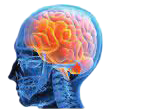5 Science-Backed Strategies for Remembering Names
Have you ever experienced that awkward moment when you meet someone you've met before, but their name completely escapes you? This common memory challenge affects millions of people. As a neuropsychologist who specializes in memory assessment, it is one of the most common concerns I hear from patients. It can cause social discomfort and affect confidence in social settings, and it is often too embarrassing to ask the person’s name again.
This challenge isn't necessarily a sign of poor memory function—it's a specific cognitive task that many people find challenging regardless of age or overall cognitive health. Why is name recall particularly difficult? Our brains process names differently than other information. Names are typically arbitrary labels without inherent meaning, making them harder to encode in memory than descriptive information. Additionally, social introductions often occur in distracting environments that divide our attention precisely when we need to focus.
The good news is that brain science shows us ways to get better at remembering names. This article describes five techniques backed by research that can help you remember names more easily. These practical methods work with how your brain naturally learns, making it simpler and more reliable to remember people's names.
1. Practice Intentional Attention
The most crucial moment for successful name recall occurs during the initial seconds of introduction. When meeting someone new:
Prepare mentally – as you arrive to your setting, remind yourself to focus on names of each person you meet. You will likely be distracted by the surrounding environment, introductions (including shaking hands), facial expressions, and other things. Try to stay focused on names and faces and remind yourself to maintain eye contact.
The quality of attention during the first few seconds of meeting someone determines how well their name gets stored in memory. Research shows that people who practice intentional attention techniques remember up to 75% more names compared to those who don't.
Delay other actions (removing coats, scanning the room) until after you've mentally registered the name.
If you miss the name initially or have forgotten it by the end of the introduction, ask again immediately rather than waiting to reduce social discomfort.
2. Use Immediate Repetition
Memory consolidation research shows that strategic repetition strengthens neural pathways:
Echo their name immediately: "Nice to meet you, James"
Use their name naturally in conversation: "What brings you here today, James?"
Mentally repeat the name silently several times while conversing
This method gives your brain multiple chances to store the name, making the memory stronger. It works well because saying the name out loud and silently repeating it in your head uses different parts of your brain to strengthen the memory.
3. Create Meaningful Associations
Our brains excel at connecting new information with existing knowledge. So, when you meet someone new, take a moment to form at least one strong association. The more personal and vivid the connection, the easier it becomes to recall their name later.
Personal Connection Strategy
Link name to someone you already know: "Sarah—like my sister"
Relate to a familiar character: “Tony from The Sopranos”
Associate with a popular figure: “Elizabeth, think Queen Elizabeth”
Visual Memory Technique
Notice distinct physical feature: “Mark with curly red hair”
Create a mental picture: “Rose holding a red flower”
Visualize with their profession: “Chef Michael in his white coat”
Word Association Method
Break names into meaningful parts: “Lee was silly [sil-LEE]”
Find rhyming words: “Blake who loves cake”
Research shows that people who actively create these mental links remember names up to 50% better than those who rely on simple repetition alone. It is most effective when the associations are made at the time of meeting someone; however, they can be made later on to reinforce your memory (such as later in the evening) provided you relate the correct name to the person.
4. Use External Memory Aids
Using different tools to support memory helps to reduce mental burden.
Make quick notes after meeting someone; include identifying details
Add contextual information: "Emma—works at Memorial Hospital, met at conference"
Take a photo with the cell phone that captures new people. Make notes afterwards
Create organized contact systems for professional or neighborhood connections
Writing engages different neural circuits in the brain independent of the verbal processing. These notes also provide reliable reference points when memory fails.
5. Use Digital Tools
Technology offers powerful, discreet memory supports:
Use smartphone notes apps for quick, searchable documentation
Create voice memos when alone for hands-free recording
Take and label photos to create visual memory cues
Develop detailed contact systems with contextual information
These tools compensate for memory limitations while simultaneously creating opportunities for spaced rehearsal, a proven technique for strengthening long-term memory.
Summary: Implementation Approach
To improve name recall in a lasting way, it’s helpful to treat it as a skill you can build rather than a fixed ability. Start by choosing one strategy—such as repeating names out loud or creating associations—and practice it regularly until it becomes natural. Once you're comfortable, you can begin adding other techniques to strengthen your memory even more. Before attending events where you’ll see people again, take a moment to review their names to help reinforce recognition. And if you forget someone’s name, don’t stress—being honest and gracious about it is perfectly acceptable and often appreciated in social situations.
About the Author: Dr. Susan Borgaro is a Clinical Neuropsychologist specializing in memory assessment and cognitive enhancement strategies. With over 25 years of experience working with patients across the lifespan, Dr. Borgaro brings both clinical expertise and practical insights to help people optimize their cognitive functioning. www.nasarizona.com

